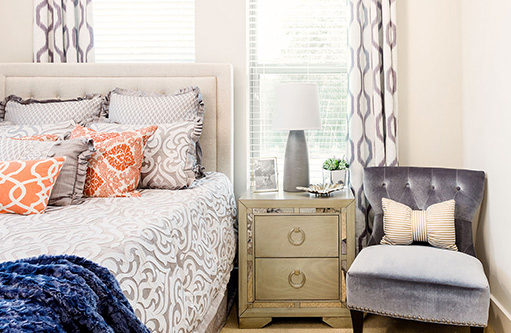
Caring for a loved one with memory loss can feel overwhelming. The home that once felt comfortable may now pose risks or create confusion. By making intentional changes, you can create a brain-friendly environment that supports safety, independence, and peace of mind.
Why the Home Environment Matters
Memory loss affects more than memory. It can change the way a person processes their surroundings, interacts with objects, and navigates daily routines. A home that feels safe and easy to understand helps reduce stress, while also lowering the risk of accidents.

Caring for a loved one with memory loss can feel overwhelming..
Key Elements of a Brain-Friendly Home
You don’t need a complete remodel to make a difference. Focus on these areas that can transform a living space into a supportive environment:
Clear and Simple Layouts
Keep rooms open and easy to move through. Avoid clutter and unnecessary furniture. Wide walkways reduce confusion and lower fall risk.
Good Lighting
Dim rooms or shadows can make it hard for someone with memory loss to feel secure. Bright, even lighting in hallways, bathrooms, and kitchens creates a sense of calm and confidence.
Labels and Visual Cues
Simple labels on drawers, cabinets, or doors can help loved ones find what they need without frustration. Pictures or symbols often work better than words alone.
Safe and Familiar Spaces
Remove tripping hazards such as rugs or cords. Lock up cleaning supplies and sharp tools. Keep personal items and familiar furniture in place, since familiarity brings comfort.
Calm Colors and Contrasts
Soft, neutral wall colors with clear contrasts—such as a light wall against a darker floor—help with depth perception. Bright colors on important objects (like a red bathroom door handle) make them easier to recognize.
Daily Routines That Support Brain Health
The home itself is important, but routines matter too. Regular schedules for meals, activities, and rest create predictability, which helps reduce anxiety. Encourage light exercise, puzzles, or music activities that keep the brain active and the mood positive.
When Home Isn’t Enough
Sometimes, even with the best setup, caregiving at home can be exhausting. Communities like Avanti Senior Living are designed with brain health in mind. Memory care neighborhoods provide:
- Safe layouts and monitored spaces
- Engaging daily programs
- Nutritious meals that support brain function
- Compassionate staff trained in dementia care
These features allow families to step back from constant worry and focus on spending meaningful time with their loved one.
Final Thoughts
A brain-friendly home doesn’t have to be complicated. With thoughtful adjustments and a supportive routine, you can create an environment where your loved one feels safe and connected. And when more support is needed, communities like Avanti offer the next step in compassionate care.

